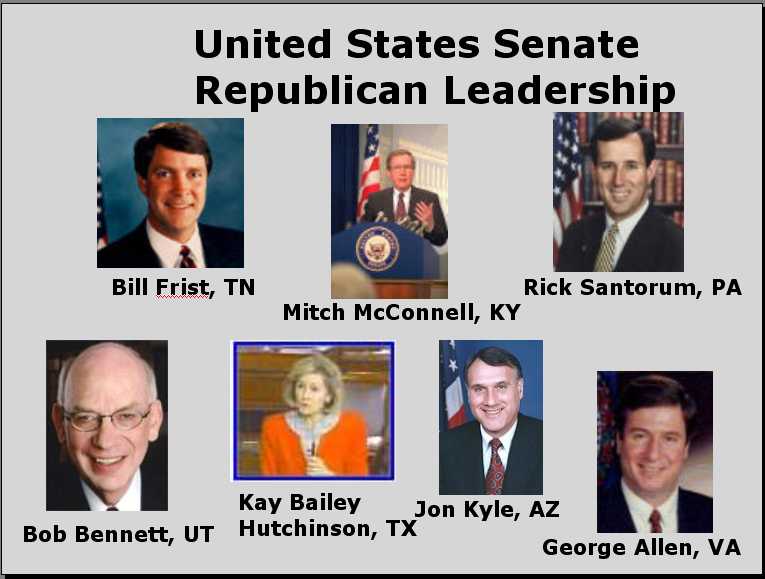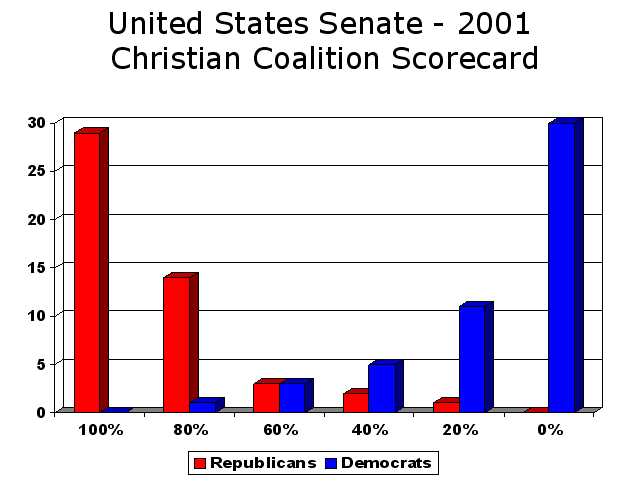The Rise of the Religious Right in the Republican Party
Home Page
Introduction
Government
Environment
Judiciary
Scalia
Federalist Society
Bush
Faith Base Initiative
Dominion Economics
Schools and Homophobia
Religious Institutions
Middle East
The Media
Satan
States' Rights
Separation of Church and State
Appeal of the Religious Right
2002 Texas GOP Platform
Biography of Joan Bokaer
This web site is produced by TheocracyWatch
a project of the Center for Religion, Ethics, and Social Policy at Cornell University
By Joan Bokaer, Executive Director
Susan McGreivy, Web Master
Last Update August, 2003
"We are talking about Christianizing America.
"Believe"
"The Christian Coalition is certain to make 1992 much more interesting and disturbing than the conventional wisdom is ready to believe. Believe." So investigative journalist Frederick Clarkson warned us after attending one of the first Christian Coalition "Road to Victory" gatherings in 1991.
Clarkson was talking about the 1992 elections. Just two years later, the Christian Coalition gave the Republican Party majorities in both Houses of Congress for the first time in forty years. Four years after that, a sitting President was impeached for a sexual indiscretion. Is the conventional wisdom ready to believe that the Religious Right could gain control over all three branches of the federal government? Is it conceivable that the United States could become a fundamentalist Christian theocracy? (For definition of "theocracy" Click Here.) The facts speak for themselves.Do you know these people?
 They are the seven highest ranking Republican Senators in the U.S. Senate.
Every one of them received a scorecard of 100% from Christian Coalition.
That means they voted with Christian Coalition 100% of the time.
How were people representing such an extreme ideological point of view elected to the top
positions in the Republican Party?
They are the seven highest ranking Republican Senators in the U.S. Senate.
Every one of them received a scorecard of 100% from Christian Coalition.
That means they voted with Christian Coalition 100% of the time.
How were people representing such an extreme ideological point of view elected to the top
positions in the Republican Party? Look at the graph on your right.
It is based on Christian Coalition scorecards, so it shows how often members of the U.S. Senate voted with or against Christian Coalition supported bills. Republicans are red, Democrats are blue.
This graph explains why the seven top ranking leaders received scores of 100%. The leaders of the Republican Party were chosen by their colleagues. As you can see by the 29 Republican Senators who received scores of 100%, and the 13 who received scores of 80% from Christian Coalition, 42 out of 49 Republican Senators in 2001 supported agenda of the Religious Right.
March Toward Theocracy
Since the Religious Right began to dominate the Republican Party, and the Republican Party won majorities in both Houses of the U.S. Congress, the influence of the Religious Right has become immense. And they have a strong ally in the White House.
President Bush is giving the Religious Right what they want the most: the courts. He is packing the U.S. federal courts with judges that are hostile to the principle of separation of church and state and would support efforts to bring the U.S. government under religious control. See Judiciary. As the court system leans more toward the agenda of the Religious Right, it is possible that this movement could end up taking control of all three branches of the U. S. government.
Christianization of the Republican Party: In Their Own Words
"Christianization of the Republican Party," an article from the The Christian Statesman, claims, "Once dismissed as a small regional movement, Christian conservatives have become a staple of politics nearly everywhere." "Christian conservatives now hold a majority of seats in 36% of all Republican Party state committees (or 18 of 50 states), plus large minorities in 81% of the rest, double their strength from a decade before."
The article explains, "the twin surges of Christians into GOP ranks in the early 1980s and early 1990s have begun to bear fruit, as naïve, idealistic recruits have transformed into savvy operatives and leaders, building organizations, winning leadership positions, fighting onto platform committees, and electing many of their own to public office. "
The Christian Statesman is a publication of the National Reform Association. Who is the National Reform Association?
"The mission of the National Reform Association is to maintain and promote in our national life the Christian principles of civil government, which include, but are not limited to, the following:
"Jesus Christ is Lord in all aspects of life, including civil government.
"Jesus Christ is, therefore, the Ruler of Nations, and should be explicitly confessed as such in any constitutional documents. The civil ruler is to be a servant of God, he derives his authority from God and he is duty-bound to govern according to the expressed will of God.
"The civil government of our nation, its laws, institutions, and practices must therefore be conformed to the principles of Biblical law as revealed in the Old and New Testaments." Click Here.
How did this happen?
Voter apathy is the key to the phenomenal ascent of the Religious Right in the U.S. government. "With the apathy that exists today, a small, well-organized minority can influence the selection of candidates to an astonishing degree." Pat Robertson wrote these words in The Millennium, 1990, and it has been a key organizing principle of the Religious Right ever since.
Pat Robertson tells us who makes up that "well-organized minority." It includes only Christians who share his point of view. As he said on his television program, the 700 Club: "You say you're supposed to be nice to the Episcopalians and the Presbyterians and the Methodists, and this and that and the other thing. Nonsense! I don't have to be nice to the spirit of the Antichrist." (Pat Robertson, the Most Dangerous Man in America? Rob Boston),
"The apathy of other Americans can become a blessing and advantage to Christians," wrote Mark Belisle and Stephen McDowell in 1989, in America's Providential History a popular textbook for Christian schools and the Christian homeschool movement. "If just 10% of all Christians in America today woke up and realized how easy it is, got involved consistently for the long haul, it would not take long to reform America completely."
For the authors, the term “Christian” refers to a very narrow group of people. The word "reform" is key. It means reforming the United Sates so that it becomes a "Christian" nation, or theocracy. The Texas Republican Party Platform, 2002, supports the same goal: "The Republican Party of Texas affirms that the United States is a Christian nation."
"How long?" continue Belisle and McDowell. "Believe it or not, it could be done within ten years…every godly representative in the state legislatures and the Congress could ... work with a godly president. New judicial appointments would begin radically changing ... the…courts ... One thing of great importance is for you to fulfill your Biblical duty to choose a godly representative by getting involved in local party politics for the rest of your life."
| Next Page |
| Americans United for Separation of Church and State Click Here | Alliance for Justice Click Here |
| Political Research Associates Click Here | People for the American Way Click Here |
| Interfaith Alliance Click Here | Institute for Democracy Studies Click Here |
Click Here to Contact Joan Bokaer